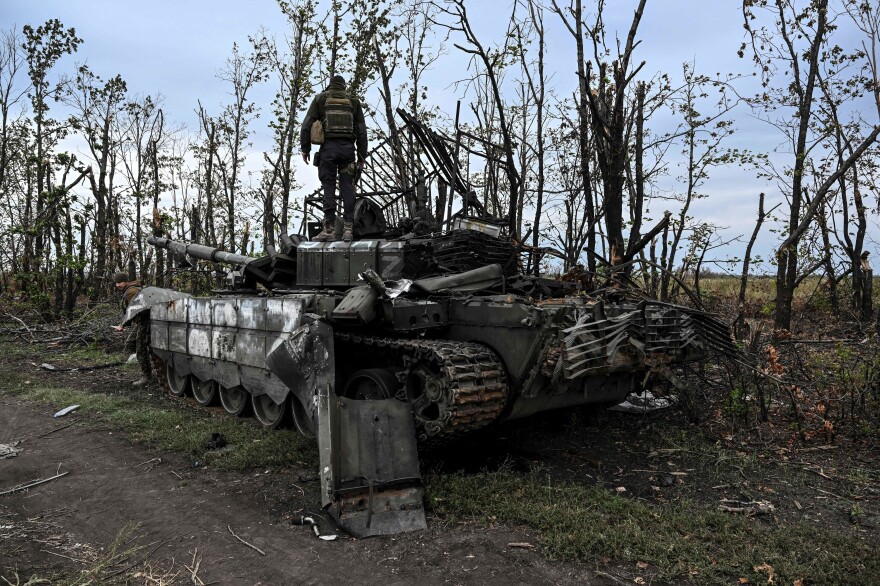Ukraine keeps laying deadly traps for the Russian military — and the Russians keep biting.
When Ukraine started talking about an offensive in the southern part of the country, Russia moved troops to reinforce the south, pulling them out of the east. Ukraine then unleashed a potent offensive in the east — where Russian forces had just thinned out.
Ukrainian tomfoolery operations continue, with what appears to be a wooden NASAMS launcher decoy. pic.twitter.com/XiCXEhHjuB
— OSINTtechnical (@Osinttechnical) September 18, 2022
"How in the world did the Russians not detect the buildup of Ukrainian forces?" said Ben Hodges, a retired U.S. lieutenant general who helped train the Ukrainians a few years ago.
"The Russians have satellites. The Russians have really top-quality electronic warfare capability. That tells you that their processes are not very good," said Hodges, who was the commander of the U.S. Army in Europe, and is now at Center for European Policy Analysis.
Ukraine's successful military offensive pointed to a recurring theme in the seven-month war: Russian mistakes and Ukrainian ingenuity.
Kelly Grieco, a senior fellow at the Stimson Center in Washington, that this Russian blunder points to the broader, systemic Russian failures.
"The Russians have been touting their modernization, these flashy objects they show us and we think, 'Wow, they're really proving their capability,'" she said. But, she added, "it's been less than meets the eye. What we've discovered is there's actually a lot of problems and bugs in these systems."
Ukraine neutralizes Russia's air force
And the Ukrainians, she notes, keep outsmarting the Russians.
At the start of the war, Russia was expected to quickly establish air superiority with its much larger, more modern air force. But Ukraine foiled the Russians, largely with old Soviet air defense systems on the ground.

The Ukrainians have relied on "shoot-and-scoot tactics, meaning that they turn on their radar, fire it at an aircraft, and then they pack up really quickly and get out of the area. By the time the Russians respond and maybe shoot a missile back, the Ukrainians have already moved away," Grieco said.
Ukraine says it's shot down more than 200 Russian planes and helicopters. That number cannot be independently confirmed, but the Russians have largely stopped flying over Ukraine.
"As a result, the Russians have never had the ability to use the skies and fly freely throughout this war," she said.
To protect its aircraft and pilots, the Russian Air Force now fires mostly long-range missiles from beyond Ukraine's borders.
But Ukraine has a plan for that as well. It's built wooden decoys of its high-value targets. This has fooled the Russians into firing valuable missiles at these worthless props, according to Ben Hodges.
"So you're launching multimillion dollar cruise missiles, toward wooden targets that are decoys," said Hodges. "This sort of agility and innovation, the MacGyver sort of stuff that they do, I think this has contributed to where we are now."
Hodges visited Ukraine's sprawling capital Kyiv just before Russia invaded in February. He was shocked when Russia tried to seize the capital in a matter of days.
"You couldn't capture Kyiv in three days if there were no Ukrainian soldiers there," he said. "It's a very complex urban environment. It has one of the biggest rivers in Europe. What I failed to appreciate is how the Russians would be so unprepared to actually fight."
After a month, the Russians gave up and retreated from the outskirts of the capital.
U.S. assistance helps level the battlefield
The Ukrainians are getting valuable US intelligence and weapons, like Javelin missiles, which a single soldier can launch from his shoulder and take out a Russian tank.
But what's a Ukrainian soldier to do if he's in the heat of battle — and his Javelin isn't working?
JoAnne Bass, the chief master sergeant of the U.S. Air Force, says the answer is simple: he makes a long-distance call to the American national guardsman in Washington state who originally instructed him.
"This young Ukrainian soldier uses the power of their telephone and they reach out to somebody who they formerly trained with," she said.
The results came quickly.
"Within 30 minutes they figured out how to troubleshoot. Then another few minutes goes by and that guardsman gets a picture of that (Russian) tank that was destroyed," she added. "It just shows the innovative spirit."
Collectively, all these episodes support what CIA Director William Burns said about Russian leader Vladimir Putin way back in March, just a couple weeks into the war.
"He was confident that he had modernized his military and they were capable of a quick decisive victory at minimal cost. Those assumptions have proven to be profoundly flawed," Burns said then.
Burns now says Putin believes he can simply outlast the Ukrainians through a long, cold winter. The CIA director says this too will prove yet another miscalculation.
Greg Myre is an NPR national security correspondent. Follow him @gregmyre1.
Copyright 2022 NPR. To see more, visit https://www.npr.org.



